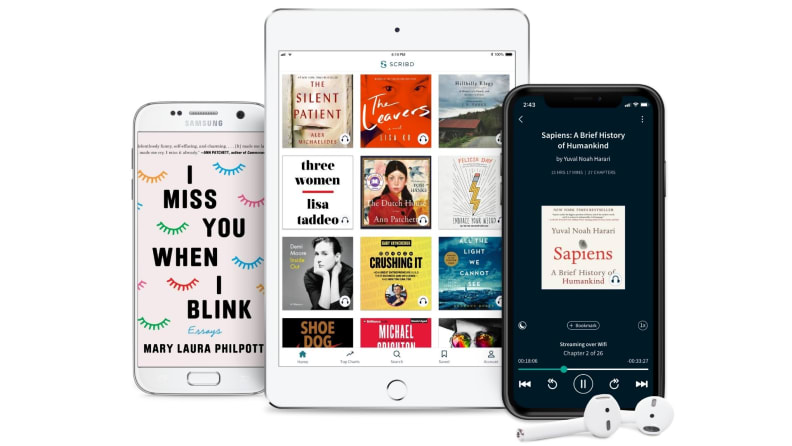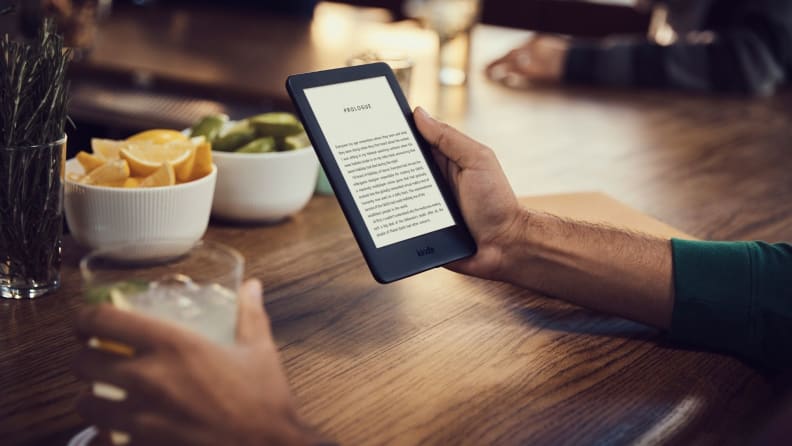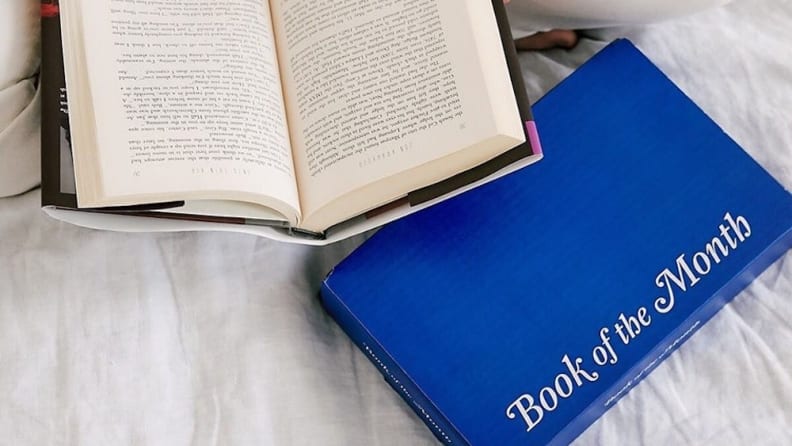Products are chosen independently by our editors. Purchases made through our links may earn us a commission.
I love to save a buck as much as the next person, but being an avid reader can sometimes get in the way of being budget-savvy.
My library card is well-worn, and with a little more time on my hands recently, I’ve been speeding through novels—like a lot of other homebound folks. These readers have also joined me in virtual queues to get our hands on the hottest books. I’m still waiting on some that I requested months ago.
So, itching for my next read, I’ve ventured outside my normal routine, with minimal damage to my wallet. Here are some ideas if you’re spending a lot of time reading and looking to save money on books, too.
Support your local library
There’s nothing cheaper than borrowing books from your nearby branch. And if you’re not making it out of the house too much these days, you can curb your book spending by downloading e-books or audiobooks straight to your device. (If you haven't checked out Libby, I can't recommend it enough!)
No Kindle? No problem. We can help you out with reading Kindle books without a Kindle, or, if you’re in the market, point you in the right direction. We’re fans of the Paperwhite: It’s light-weight, you can read it in many lighting situations, and it doesn’t emit blue light like a tablet.
I love digital library downloads because they save time and money. There’s no need for trips to the library to pick up or return something, and there are never late fees because the loans automatically go back on the shelf on the due date.
Plus, libraries have branched out these days. You can borrow everything from museum passes to gardening gear and tablets. You may even have one near you that loans out home improvement tools.
If you don’t have a library card, check online before you make the trip. You may be able to sign up for one without visiting.
Consider an audiobook subscription

Attention, multitaskers. You can walk, clean, tackle yardwork all while listening to an audiobook.
Unlike the library with its two-week window, you can leisurely read the book (or listen) at your own pace with a Scribd subscription. There’s no due dates to abide by here. And at $9.99 per month, this service comes in cheaper than the popular Audible's Premium Plus.
While it does appear to have a few less titles available, I prefer this to Audible for a handful of reasons: It’s cheaper, duh. It includes both audiobooks and e-books (though you’ll have to read them on your phone or tablet). There’s no dealing with credits, and if you have a busy month coming up, it’s easy enough to pause the subscription until your schedule clears up. Oh, and you have unlimited access.
A word on that: Despite this claim, after I sped through three or four audiobooks in the span of a couple weeks, the rest of my bookshelf was not available until the next month, though I could still access other titles I hadn’t saved, particularly e-books. Though it does not appear to be truly unlimited, it’s still more bang for your buck than Audible—though we have plenty of staff members who are big fans, and I’d be lying if I didn’t mention the newspaper benefit with subscriptions to The New York Times, The Wall Street Journal, and The Washington Post hasn’t tempted me to reconsider.
Or maybe a digital subscription

You can instantly download all of the books straight to your Kindle.
I’ve been a proud Kindle owner—of the very same device!—for nearly two decades.
For fellow e-readers, there’s a few plusses to a Kindle Unlimited subscription. Amazon Prime members will see the fee appear with their accounts—it’s not another monthly charge you have to keep track of on your credit card statement.
But more so, my library download can only be accessed from one device that I have to select when I check it out. With Kindle Unlimited, I can access the same borrowed book from my e-reader and my phone no problem, and this convenience factor has come in handy quite a few times. If I’m stuck waiting for an appointment, it doesn’t matter if I didn’t think to bring along my Kindle, or it’s in my bag but needs to be charged. I can pick up right where I left off seamlessly between devices.
Not to mention, the subscription also comes with access to dozens of magazines and countless audiobooks.
Get a monthly delivery

Expand your personal library with this service for bibliophiles.
With a Book of the Month subscription, the book store comes to you—as you might’ve guessed—once a month.
The $15 is cheaper than a brand-new hardcover, and if you like being ahead of the curve, good news: Subscribers often have early access to anticipated bestsellers before the rest of the public.
You can skip any month if you know you have a particularly busy few weeks coming up. And unlike some other subscription services you may use, Book of the Month doesn’t charge your credit card or add a credit that you have to use later. If you have some extra downtime, you can even add one or two more titles to your shipment for $9.99 each. Steal!
Read the classics
Maybe you’d like to give them a little more attention than you did in high school. Luckily for you, anything past the copyright expiration is up for grabs as it’s considered public domain. That generally happens 70 years after the death of the author, or 95 years after the work was first published.
Check out sites like the Gutenberg Project, or head straight to the Kindle store, where The Picture of Dorian Gray, A Tale of Two Cities, Anne of Green Gables, and thousands of other free texts are waiting for you.
And mark your calendar: New titles are released every January. Come 2021, The Great Gatsby will be among the latest to make the cut.
6. Swap with friends
And it doesn’t have to be a formal book swap.
Before meeting up, I’ll shoot a text message to share a few titles that I’m looking to clear from my bookshelves, and they’ll share theirs. And if your friends are big readers, there’s the added bonus of built-in recommendations for good books.
If you’re not meeting up with people these days, you can send them through the USPS as media mail—significantly cheaper than sending a standard package. I recently mailed a friend three paperbacks for three dollars and some change.
Buy used books
Just like my neighborhood juice shop, my local used bookstore gives you a free book for every 10 you buy. They even have an online store up and running during the pandemic. In one of my recent orders, I bought seven books for the price of one hardcover, and it filled in my color-coded bookcase.
Another one I frequent offers a flat percentage when you bring in your own used books, and they’ll kick it up another 5% if you opt for store credit—a win for your wallet and your community.
Peruse the bargain aisle
You can even do it online. Barnes and Noble sells books at a discount through its Book Annex, with a particularly large selection of children’s books available.
You can also head over to bookoutlet.com, and search for its “bargain books,” excessive inventory that booksellers or publishers are looking to get off their hands. Right now you can find one of Oprah’s picks, Tayari Jone’s An American Marriage, for half the current price on Amazon. Or scoop up Lisa Ko’s National Book Award finalist The Leavers for $6, more than 50% off the Amazon price. Happy saving!
Sign up for a newsletter
There’s a lot of things vying for my attention in my inbox, but I regularly open Bookbub’s daily email. They scour the internet for the best Kindle deals, and have scrounged up sales on everything from Lisa Jewell’s The Girls in the Garden to Mark Bittman’s How to Cook Everything. You’ll scroll through YA novels, beach reads, political thrillers, non-fiction tales, and more, all ranging from $1 to $3. And if you don’t want to further inundate your inbox, you can browse the site for the same deals, too.
Preorder a book
OK, OK. So you may not save any money when you pay for the retail price of a book. But there are a lot of good reasons to do it. For one, it helps out authors, as publishers can gauge interest in the title before its release.
For another, I tend to find that if I preorder a book, I forget about it by the time it shows up in my mailbox months later, and the surprise makes my day a little bit better. I can’t be the only one who likes sending my future self a present.
But here’s a little-known fact about clicking buy before the pub date, and this one could actually save you money: Many booksellers, including Amazon, will honor a price change. So, click confidently; there’s no need to hold out if you’re fretting about the price dropping.
The product experts at Reviewed have all your shopping needs covered. Follow Reviewed on Facebook, Twitter, and Instagram for the latest deals, product reviews, and more.


